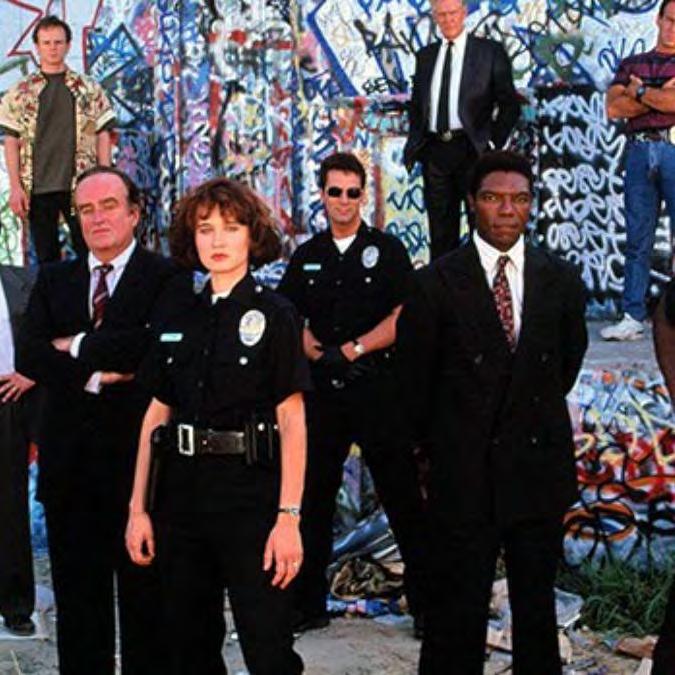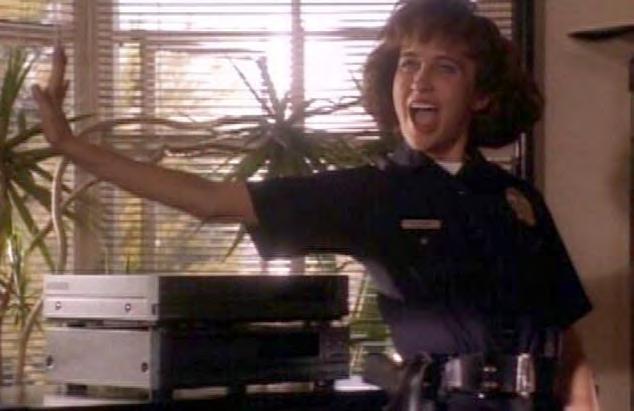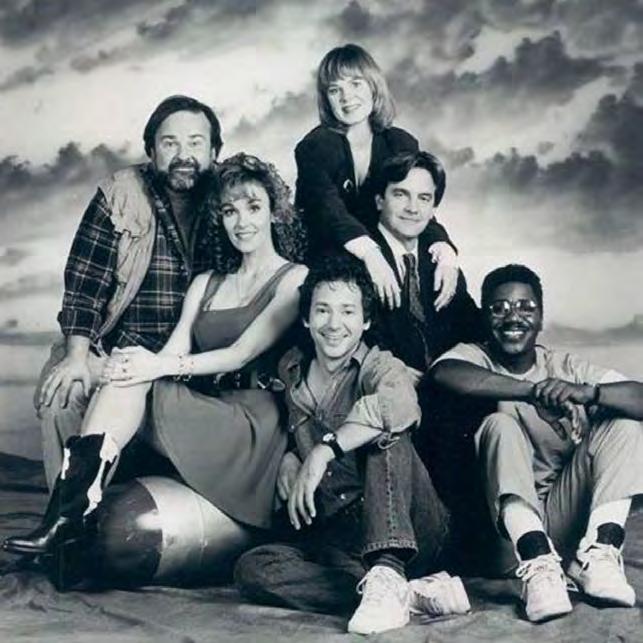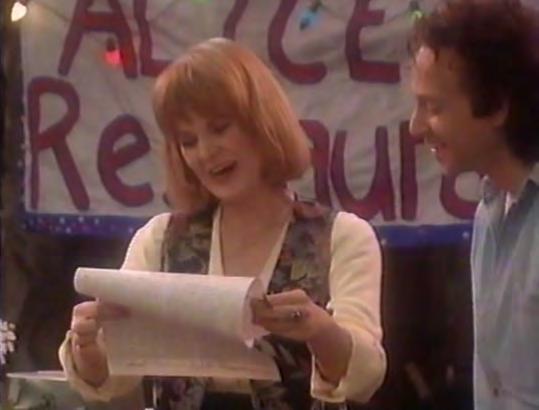
13 minute read
Cop Rock The O.I.L. Factor: An Empirical Analysis of Why Woops! Failed 45
Cop Rock debuted on September 26, 1990 and it ended on December 26, 1990 after one season and 11 episodes. The series starred Anne Bobby as Vicki Quinn, Ronny Cox as Roger Kendrick, Vondie Curtis-Hall as Warren Osborne, and Barbara Bosson as Louise Plank. Coming off the success of several police shows and L.A. Law, Steven Bochco was given free rein and came up with the idea of a cop show that was also a musical. The series originally aired on ABC in the U.S. Cop Rock is available on DVD. It is not currently streaming.

Advertisement
“Look, I’m basically going to do Hill Street again…there’s only one thing we’re going to do differently. They’re going to sing.” – Composer Mike Post describing how Steven Bochco asked him to work on Cop Rock
To truly understand the wonder and the glory that is Cop Rock, one must first appreciate the context in which the series was created. For those who watched TV in the 1980s, the name Steven Bochco was synonymous with dramatic television success. From 1981 to 1989, he won nine Emmy awards for outstanding series or outstanding writing. He even won Peabody Awards, which honor the most powerful, enlightening, and invigorating stories in television. Bochco is renowned for L.A. Law and for Doogie Howser M.D., but what he is most famous for is cop shows like Hill Street Blues, Bay City Blues, and NYPD Blue.
He was a serious artist to be taken seriously. So when ABC offered him complete creative control and a near unlimited budget to make a cop show, Bochco decided he wanted to make something audacious. He wanted to do a police procedural unlike anything that had ever been done: a hard-hitting crime drama that was also a musical. Bochco gathered an all-star group of behind-the-camera talent to realize his dream.
“Everybody said you’re nuts, you’re crazy. I guess I had such a passion for the idea that I talked everyone into it, including Randy Newman, who said ‘you’re an idiot.’” – Steven Bochco
At the time, Randy Newman already had multiple academy awards, two Grammy Awards, a pair of platinum records, and his duet with Paul Simon on the Billboard Hot 100. In short, he was an icon of the music industry. Joining Newman on writing songs was Mike Post: one of the few TV composers whose theme songs regularly got radio play. Among other hit songs, he was the composer of “Believe it or Not,” (theme song to The Greatest American Hero) which was a number 2 radio play hit. He wrote themes to The A-Team, Quantum Leap, and Magnum P.I. Bochco was determined to capture the spontaneous energy and dynamic performances of a Broadway show, and insisted that all the songs would be performed by the actors live during the filming. This dedication to the craft caused significant issues, both in terms of finding actors who could sing, dance, and act, and also in terms of production schedules, not to mention the complexity of shoots.
“It was a glorious failure, in that when we did it well, we did it really well. It was unbelievable that we could pull it off.”
– Composer Mike Post
But these technical innovations led to Cop Rock becoming one of the most expensive series that had ever been made at that time. At a reported cost of $1.8 million per episode, the studio funding this passion project began to get nervous. The show premiered on September 26, 1990. The nervousness began to grow as the first reactions came in from the press. David Letterman was obsessed with making fun of the show, without ever having seen an episode. He did four separate comedy segments about Cop Rock the week before it aired. You might say that Cop Rock was destined to fail. The premise was just too easy to mock. Even now, 30 years later John Oliver is making light of the show by playing the song “Baby Merchant” as a late-night punchline. The night of Cop Rock’s premiere on ABC, rival NBC’s forgettable cop show Hunter aired in the same time slot and was watched by 17 million people. CBS’ show Davis Rules—which is considered a flop—was watched by 14 million. And Cop Rock? Just shy of 7 million people tuned in. The numbers were disastrous. In October, less than a month after the pilot aired, ABC president Bob Iger phoned Bochco and asked him to convert the show into a more standard cop drama by removing the musical numbers. Iger suggested that if it were a little less weird, people might tune in. Bochco refused. The ratings continued to decline. Cop Rock was the 80th most-watched Television show on the air… out of 101 shows. It was also the most expensive. The network pulled the plug on November 12, 1990 after only 11 episodes. The series ends with a surreal musical number in which the characters sing about their own cancella-
But it’s interesting to note that there had been previous detective shows that were musicals. In the UK, the Singing Detective was a major hit in 1986, successful enough that Robert Downey Jr. remade it as a movie.
Bochco himself invited the comparison to the UK series, telling reporters "I think Singing Detective is possibly the best seven hours of television I've ever seen. Period: without qualification." The thing that makes Cop Rock endure in the public consciousness is the sheer audacity of it. The obvious and safe choice would have been to use the basic cop show template. Bochco could have franchised Hill Street Blues like they did with CSI or NCIS. There could have been Hill Street Blues: Las Vegas and Hill Street Blues: Special Victims Unit. But how boring would that have been? If nobody has the gumption to try something crazy, all we’ll see is safe and predictable television made for mass consumption. The talent behind the series really shines through in the music. Some of these songs are actually pretty damned good, and they all drive the narrative forward. This isn’t a cop show with songs added, it’s a cop show in which the songs are integral to the story. The massive dance numbers and productions are kind of unreal—hordes of extras and complex choreography. When this show works, the energy is palpable. And the songs are bizarrely catchy. Tony winning actor Ben Vereen knocks in out of the park with the song “He’s Guilty.” In the end, the series was best summed up by star Anne Bobby, who played Officer Vicki Quinn in the 11 episodes that aired.
"My feeling is that the recent rediscovery of the show really is redemption for everyone involved. The show was very much ahead of its time. With Empire and Glee, the medium has finally caught up to the vision we had."


Woops! debuted on September 27, 1992 and it ended on December 6, 1992 after one season and 11 episodes. The series starred Fred Applegate as Jack Connors, Cleavant Derricks as Frederick Ross, Meagen Fay as Alice McConnell, Marita Geraghty as Suzanne Stillman, Lane Davies as Curtis Thorpe, and Evan Handler as Mark Braddock. The show follows what Steve Goodman would have called the post-nuclear nuclear family, trying to survive and reestablish civilization in the wake of a nuclear apocalypse. The series originally aired on Fox in the U.S. If you want to watch Woops!, you’re out of luck, it is neither streaming nor available on physical media.
In September of 1992, my wife and I discovered a bizarre, short-lived sitcom called Woops!. The premise of the show was that during a military parade, some kids were fooling around with a remote-controlled car which accidentally caused a nuclear warhead to launch and sparked off a nuclear war, killing nearly all of humanity. Six survivors ended up in an abandoned farmhouse that was inexplicably well stocked. They all came from different backgrounds and ideologies, but they had to work together to survive and rebuild society.
The show featured an ensemble cast of four men and two women. Evan Handler, thin and sporting a mop of hair (I know…right?), led the cast as the clear-headed narrator, playing a former school teacher who survived the nuclear blast because he was in his Volvo at the time (and they clearly make them pretty safe and reliable). Lane Davies played Curtis, an aggressive, greedy venture capitalist who always wore a tie, even when working on the farm. Cleavant Derricks, years before his five-year stint on Sliders, played a dour pathologist who also happened to be the only black survivor. Meagen Fay played an annoying stereotypical


progressive feminist bookstore owner. Fred Applegate played an eternally optimistic homeless man. And Marita Geraghty played a pretty, ditzy, hair salon employee. My wife and I immediately loved the show. This was something truly new, something that really pushed the boundaries of narrative and good taste. This was a show for “our kind of people,” not for the typical Fox audience who laughed at Al Bundy’s latest antics, giggled at Homer choking Bart, guffawed at “Men on Film” giving an “around the world and back snap,” or repeatedly imitated Boomhauer’s Texas gibberish. This was a true original. In retrospect, the show was doomed to fail from the start. The Fox Sunday lineup was already a slam dunk with two episodes of Cops starting at 7:00 pm, followed by The Simpsons, King of the Hill, In Living Color, Married…with Children, and the local news. Clearly, the Fox executive who approved the show wanted to fill a 10:30 pm slot with something new and different, but place it where it could do the least harm. It lasted all of 10 episodes. (An additional three episodes were filmed, but never aired.) The show was silly and unsubtle, and that was the whole point. Everything was tongue in cheek. Since the Cold War was now over—the Berlin Wall fell in 1989, and the U.S.S.R. fell in 1991—it was finally safe to spoof the decades’ long dread of nuclear war that haunted our country. The conceit of the show, as I saw it, was to use a darkly humorous premise to explore the variation in human condition and stereotypical tropes inherent in society. It used sophomoric humor to appeal to a wider audience, but still commented on the sociopolitical issues of the time. Or at least, it tried to. TV Guide had a different view. Not only did they refer to the show as a “post-apocalyptic Gilligan’s Island,” which was probably true, but they also rated it the 42nd worst show on television, which was horribly unfair. How dare they group Woops! with the likes of Jerry Springer, My Mother the Car, and Hee-Haw Honeys? For years, my wife and I blamed the Fox network and their habit of greenlighting creative shows but then killing them before they could get a footing. The Fox canceled shows were a rogues’ gallery of sci fi convention sweethearts: Alien Nation, Firefly, Tru Calling, The Adventures of Brisco County Jr., Terra Nova. The list goes on and on. However, the more that I thought about it, the more I realized that the secret sauce of syndication success is not only based on external factors, such as promotion, favoritism, and luck. Often, success comes from a show’s visual appeal, the celebrity of its actors, and its O.I.L. (originality, intelligence, lens). In fact, this last factor is often overlooked by the studio elite until its writers go on strike. O.I.L. puts a quantitative spin on the underlying qualitative nature of a script. It is particularly useful for analyzing sit-coms. If one imagines a three-dimensional graph, “originality” is on the x-axis, ranging from 1 (totally unoriginal, safe, and tested) to 10 (completely original, edgy, and new). “Intelligence” sits on the y-axis and ranges from 1 (low humor and obvious jokes) to 10 (intelligent writing, subtle humor, and esoteric references). “Lens” sits on the z-axis and ranges from 1 (incredibly broad appeal) to 10 (narrow, targeted appeal). It is not easy to be a solid 5 on each factor. One wants content original enough to stand out from the competition, but not so original that the audience has no context to process it; intelligent enough that the audience is not insulted, but not so intelligent that the audience is alienated; broad enough in appeal that you build a viewership, but targeted enough to create a passionate fan base. Fox’s flagship show, The Simpsons, is a perfect example of 5’s on all axes. A sitcom about a dysfunctional, working-class family is not very original until you animate it, stage it in a town with a nuclear reactor, and add in Matt Groening’s biting cynicism. The writing is truly intelligent, hitting its jokes without overemphasizing them, incorporating in-jokes and literate commentary, but punctuating all of this with crowdpleasing catch-phrases (“Don’t have a cow, man!”) and physical humor. The lens of its appeal is broad, creating a world everyone understands, but adding in enough biting satire to make people feel like one of the incrowd. No wonder it has lasted 32 seasons. Woops! didn’t do that. Long before Netflix and YouTube allowed for super-focused audience platforms, network shows lived and died by the Nielsen ratings. Woops!’s highly original premise was outside the realm of comprehension of many viewers. It wasn’t that they couldn’t follow the plot; they couldn’t understand why one would make fun of thermonuclear war. Its lens of appeal was similarly focused, landing on a select audience that loved its irreverence and satire. And its intelligence—well, its intelligence was uneven. Take episode 6, “The Election.” Mark (Evan Handler) is the only person who knows how to fix the
generator, so the group decides that he should have the biggest bedroom as a reward for keeping the power on. Curtis (Lane Davies) wants the biggest bedroom, so—despite having no knowledge of how to repair a generator—he convinces the other residents that the job of generator maintenance should be put to a vote. He mounts a national-style election campaign (appropriating unnaturally folksy language, using “us” vs. “them” metaphors, etc.) writ small across only six people. In the end, what should have been a close election goes to Curtis when Suzanne, the ditzy one, forgets to vote. It was as subtle as a hernia. My favorite story was episode 10, “Say it Ain’t So, Santa.” Santa, played by Stuart Pankin (who also played Earl on Dinosaurs, another under-appreciated sitcom), visits the farm. In the course of the episode, it comes out that Santa has survivor’s guilt because he made it into his fallout shelter, but he couldn’t open the hatch to let in Mrs. Claus and the elves, leaving them to burn up outside. Eventually, we learn that this wasn’t really Santa’s fault. A lifetime of coming down chimneys meant that he never learned how to work a doorknob. Subtle? No. Tasteful? No. Intriguing? Possibly. Funny? Oh, yes. Subjectively, Woops! scores an O.I.L. of 9-4-8. Its score is far from the coveted 5-5-5, but even worse, its score is unbalanced. Even Married…with Children, a Fox show with simple writing, over acting, unpleasant characters, and telegraphed jokes, scores a balanced 2-2-2, which is why it lasted 11 seasons. If O.I.L. scores are not all fives, it is critical that the scores are a balanced set of numbers if the show wants to find an audience.
Who knows if Woops! will find a new audience among Millennial or Gen Z viewers who come across it as they scour the forgotten reaches of social media. The show is no longer the most original, weird, wacky, wicked, or tasteless thing on TV. By now, I’m sure that even Spongebob Squarepants has done an episode on nuclear Armageddon. But Woops! will always have a special place in my heart. It’s the Brave Little Engine that Couldn’t.












